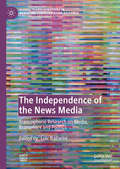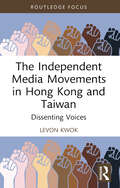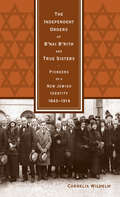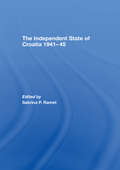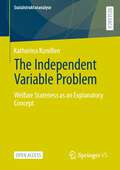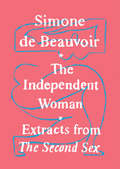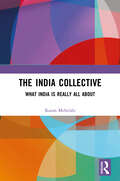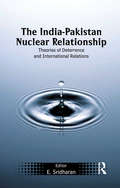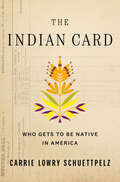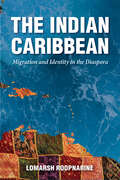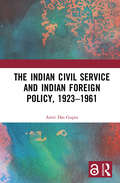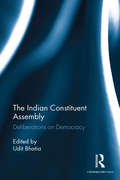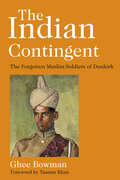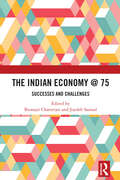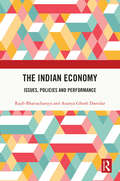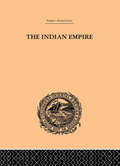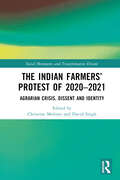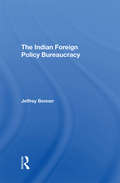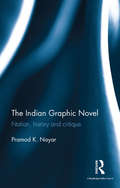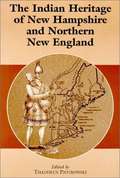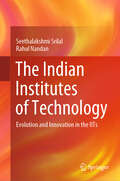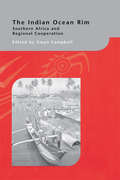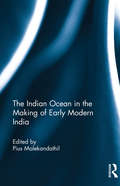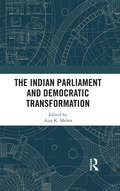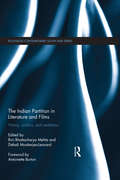- Table View
- List View
The Independence of the News Media: Francophone Research on Media, Economics and Politics (Global Transformations in Media and Communication Research - A Palgrave and IAMCR Series)
by Loïc BallariniThis book explores the different ways Francophone research on news media has faced the challenges of dependence and independence from three complementary perspectives. The first is economics - how can sustainable business models be developed and to what extent can crowdfunding help to maintain the financial and editorial independence of newsrooms? Secondly, in a time where the role of journalism in the public sphere is more questioned than ever, the authors evaluate to what extent news media can embody the needs of their readers. Thirdly, the authors consider the historical and political context of publication in the light of the ‘Arab Spring’. This book deals with major, contemporary evolutions of news media, bringing together research that considers the media in France, Canada, and the Arab region (notably Tunisia, Algeria, Morocco, and Egypt). Using numerous case studies, this book helps to define how complex the question of independence is today.
The Independent Media Movements in Hong Kong and Taiwan: Dissenting Voices (Routledge Focus on Asia)
by Levon KwokThis book examines the independent media movements by Inmediahk and Coolloud – long-established, autonomous media organizations that have agitated for the development of media freedom and human rights in Hong Kong and Taiwan since 2004 and 1997, respectively. Based on direct interviews with the founders and core members of Inmediahk and Coolloud, the author investigates the origins, growth, and achievements of Inmediahk and Coolloud's media social movements as well as the current challenges the two independent media outlets encounter with regard to funding, increasing socio-political pressure, and the complicated media environments in Hong Kong and Taiwan using the method of qualitative content interpretation. Moreover, the practicality of social media and independent media in contemporary social movements, including the 2019 Anti-Extradition Bill Movement in Hong Kong, is reviewed according to text analysis. Considering the prospect of media activism from a non-western perspective, this book will appeal not only to scholars and researchers with interests in media, social movement, and cultural studies, but also to media workers and activists across the globe.
The Independent Orders of B'nai B'rith and True Sisters: Pioneers of a New Jewish Identity, 1843-1914
by Cornelia WilhelmExplores the roles of the two oldest American Jewish fraternal organizations in the process of American Jewish identity formation.
The Independent State of Croatia 1941-45 (Totalitarianism Movements And Political Religions Ser.)
by Sabrina P. RametThis special issue provides important new scholarship from a variety of perspectives on the structure, ideology and political history of the central fascist group in interwar and Second World War Yugoslavia, the Croatian Ustasha. It is the first volume in English to closely explore the Ustasha’s Independent State of Croatia between 1941 and 1945, a period when it was an active collaborator with Nazi Germany and Fascist Italy, and largely responsible for Yugoslavia suffering the highest proportion of national casualties in the Second World War. By using the top scholars in the field to explore the nature of the NDH, The Independent State of Croatia 1941-45 contributes to scholarly understandings of Croatian nationalism, Balkan politics, European fascism, and genocide in the Second World War.
The Independent Variable Problem: Welfare Stateness as an Explanatory Concept (Sozialstrukturanalyse)
by Katharina KunißenThis open access publication deals with the operationalisation of the welfare state as an independent variable.To study how welfare states affect social inequality, individual behaviour, attitudes and more in different countries, an empirical operationalisation of the welfare state or specific elements of social policy is required. However, this operationalisation is fraught with some important problems. These problems essentially relate to one point: while there are a large number of contributions dealing with the measurement of differences between welfare states per se and as a dependent variable, there is a lack of feasible recommendations for a standardised operationalisation of welfare stateness as an independent variable.So far, there has been no systematic investigation of how such different approaches may affect the results and their comparability. Also missing is an in-depth conceptual discussion of which features of the welfare state are particularly relevant for explaining certain effects.This book fills both gaps. First, it exposes the pitfalls of existing approaches and shows how much empirical results can vary depending on the operationalisation chosen. Second, it proposes a framework for a standardised conceptualisation and operationalisation of social policies as independent variables that constrains operational decisions in a theoretically meaningful way.
The Independent Woman: Extracts from The Second Sex
by Simone De Beauvoir“Like man, woman is a human being.” When The Second Sex was first published in Paris in 1949—groundbreaking, risqué, brilliantly written and strikingly modern—it provoked both outrage and inspiration. The Independent Woman contains three key chapters of Beauvoir’s masterwork, which illuminate the feminine condition and identify practical social reforms for gender equality. It captures the essence of the spirited manifesto that switched on light bulbs in the heads of a generation of women and continues to exert profound influence on feminists today.
The India Collective: What India is Really All About
by Karan MehrishiProsperous countries have a socio-economic operating system, which India lacks. This book argues that India must incorporate a structure aligned with its collective identity to compete globally for wealth creation. The book, divided into three epochs—Past, Present, and Future—offers a comprehensive understanding of India as a country, economy, and value system.Print edition not for sale in South Asia (India, Sri Lanka, Nepal, Bangladesh, Pakistan and Bhutan)
The India-Pakistan Nuclear Relationship: Theories of Deterrence and International Relations
by E. SridharanConflict resolution and promotion of regional cooperation in South Asia has assumed a new urgency in the aftermath of the nuclear tests by India and Pakistan in 1998, and underlined by the outbreak of fighting in Kargil in 1999, full mobilization on the border during most of 2002, and continued low-intensity warfare and terrorism in Jammu and Kashmir. The stability of nuclear deterrence between the two countries is therefore a matter of great urgency and has found a place on the scholarly agenda of security studies in South Asia.Several books have been written on India’s nuclear programme, but these have been mostly analytical histories. The India-Pakistan Nuclear Relationship is a new departure in that it is the first time that a group of scholars from the South Asian subcontinent have collectively tried to apply deterrence theory and international relations theory to South Asia.
The Indian Card: Who Gets to Be Native in America
by Carrie Lowry SchuettpelzA groundbreaking and deeply personal exploration of Tribal enrollment, and what it means to be Native American in the United States “A genre-bending work of reportage, memoir, and history” —The New Yorker“Candid, unflinching . . . Her thorough excavation of the painful history that gave rise to rigid enrollment policies is a courageous gift to our understanding of contemporary Native life.” —The Whiting Foundation Jury Who is Indian enough?To be Native American is to live in a world of contradictions. At the same time that the number of people in the US who claim Native identity has exploded—increasing 85 percent in just ten years—the number of people formally enrolled in Tribes has not. While the federal government recognizes Tribal sovereignty, being a member of a Tribe requires navigating blood quantum laws and rolls that the federal government created with the intention of wiping out Native people altogether. Over two million Native people are tribally enrolled, yet there are Native people who will never be. Native people who, for a variety of reasons ranging from displacement to disconnection, cannot be card-carrying members of their Tribe.In The Indian Card, Carrie Lowry Schuettpelz grapples with these contradictions. Through in-depth interviews, she shares the stories of people caught in the mire of identity-formation, trying to define themselves outside of bureaucratic processes. With archival research, she pieces together the history of blood quantum and tribal rolls and federal government intrusion on Native identity-making. Reckoning with her own identity—the story of her enrollment and the enrollment of her children—she investigates the cultural, racial, and political dynamics of today’s Tribal identity policing. With this intimate perspective of the ongoing fight for Native sovereignty, The Indian Card sheds light on what it looks like to find a deeper sense of belonging.
The Indian Caribbean: Migration and Identity in the Diaspora (Caribbean Studies Series)
by Lomarsh RoopnarineWinner of the 2018 Gordon K. and Sybil Farrell Lewis Award for the best book in Caribbean studies from the Caribbean Studies Association This book tells a distinct story of Indians in the Caribbean--one concentrated not only on archival records and institutions, but also on the voices of the people and the ways in which they define themselves and the world around them. Through oral history and ethnography, Lomarsh Roopnarine explores previously marginalized Indians in the Caribbean and their distinct social dynamics and histories, including the French Caribbean and other islands with smaller South Asian populations. He pursues a comparative approach with inclusive themes that cut across the Caribbean. In 1833, the abolition of slavery in the British Empire led to the import of exploited South Asian indentured workers in the Caribbean. Today India bears little relevance to most of these Caribbean Indians. Yet, Caribbean Indians have developed an in-between status, shaped by South Asian customs such as religion, music, folklore, migration, new identities, and Bollywood films. They do not seem akin to Indians in India, nor are they like Caribbean Creoles, or mixed-race Caribbeans. Instead, they have merged India and the Caribbean to produce a distinct, dynamic local entity. The book does not neglect the arrival of nonindentured Indians in the Caribbean since the early 1900s. These people came to the Caribbean without an indentured contract or after indentured emancipation but have formed significant communities in Barbados, the US Virgin Islands, and Jamaica. Drawing upon over twenty-five years of research in the Caribbean and North America, Roopnarine contributes a thorough analysis of the Indo-Caribbean, among the first to look at the entire Indian diaspora across the Caribbean.
The Indian Civil Service and Indian Foreign Policy, 1923–1961
by Amit Das GuptaThis book provides an authoritative account of the first significant overseas diplomatic missions and forays made by Indian civil servants. It recounts the key events in the formative decades of Indian foreign policy and looks at the prominent figures who were at the centre of this decisive period of change. The book explores the history and evolution of the civil and foreign services in India during the last leg of British rule and the following era of post-independence Nehruvian politics. Rich in archival material, it looks at official files, correspondences and diaries documenting the terms served by the pioneers of Indian diplomacy, Girja Shankar Bajpai, K.P.S. Menon and Subimal Dutt, in Africa, China, the USSR and other countries and their relationship with the Indian political leadership. The book also analyses and pieces together the activities, strategies, worldviews and contributions of the first administrators and diplomats who shaped India’s approach to foreign policy and its relationship with other political powers. An essential read for researchers and academics, this book will be a useful resource for students of international relations, foreign policy, political science and modern Indian history, especially those interested in the history of Indian foreign affairs. It will also be of great use to general readers who are interested in the history of politics and diplomacy in India and South Asia.
The Indian Constituent Assembly: Deliberations on Democracy
by Udit BhatiaThe Indian Constituent Assembly laid the foundations of the largest democracy in the world. The debates between the members of the Assembly form the bedrock of the Indian Constitution. The chapters in this volume propose a range of methodological perspectives from which these critical debates might be read. Adopting a multidisciplinary approach, they explore themes such as party politics, ideas of rights, including caste and minority rights, social justice and the philosophy of free speech. A major contribution to the study of Indian politics, this book will be indispensable to political scientists, political theorists, legal scholars, historians, lawyers and general readers interested in the history of the Indian Constitution.
The Indian Contingent: The Forgotten Muslim Soldiers of Dunkirk
by Ghee Bowman‘An incredible and important story, finally being told’ Mishal Husain‘Groundbreaking ... a riveting and moving account’ Yasmin KhanOn 28 May 1940, Major Akbar Khan marched at the head of 299 soldiers along a beach in northern France. They were the only Indians in the British Expeditionary Force at Dunkirk. With Stuka sirens wailing, shells falling in the water and Tommies lining up to be evacuated, these soldiers of the British Indian Army, carrying their disabled imam, found their way to the East Mole and embarked for England in the dead of night. On reaching Dover, they borrowed brass trays and started playing Punjabi folk music, upon which even ‘many British spectators joined in the dance’. What journey had brought these men to Europe? What became of them – and of comrades captured by the Germans? With the engaging style of a true storyteller, Ghee Bowman reveals in full, for the first time, the astonishing story of the Indian Contingent, from their arrival in France on 26 December 1939 to their return to an India on the verge of partition. It is one of the war’s hidden stories that casts fresh light on Britain and its empire.
The Indian Economy @ 75: Successes and Challenges
by Joydeb Sasmal Biswajit ChatterjeeThis book focuses on the economic challenges India has been facing since its independence in 1947. It traces the country’s journey of economic transition and critically analyzes themes such as the political economy of development, agriculture, macroeconomy, industry and labor, money and finance, trade liberalization, gender, welfare, energy, and the environment. The volume also addresses the issues of increasing income inequality, mass unemployment, and environmental degradation and suggests policies for efficient and desirable outcomes in socio-economic development.This is an important and timely contribution that it will be of interest to scholars and researchers in economics, development studies, political economy, management studies, public policy, and political studies. It will also be useful to policymakers.
The Indian Economy: Issues, Policies and Performance
by Rajib Bhattacharyya Ananya Ghosh DastidarThis book provides a detailed structured analysis of the transition that has taken place in the Indian economy since independence to the present times (including the period of COVID-19 pandemic). Analysing objectives, achievements and failure of planning, the book discusses the crisis in the late 1980s, followed by economic reforms – structural changes and stabilization policies implemented along with regional variation on the development pattern across states.The book also examines policies of distribution, poverty, inequality, and unemployment, reform measures in major sectors, namely, banking or financial sector in general, tax or fiscal policy, external or trade and exchange rate policy. This volume will be useful for students, researchers and faculty working in the field of economics, development studies, political science and public administration. The book will also be an invaluable companion to policymakers looking for a thorough and compact view of the transition in the Indian economic situation and the resulting policy changes which took place since India’s independence.
The Indian Empire: Its People, History and Products
by W.W. HunterFirst Published in 2000. Routledge is an imprint of Taylor & Francis, an informa company.
The Indian Farmers’ Protest of 2020–2021: Agrarian Crisis, Dissent and Identity (Social Movements and Transformative Dissent)
by Christine MolinerThe Kisan Andolan or the Indian farmers’ protest of 2020–2021 is one of the longest and biggest (and victorious) social movements in the history of independent India. This book adopts a multidisciplinary approach to contextualise the movement in the long run. It engages with the historical, social and religious roots of the Andolan, examining what makes it so unique and transformative for Indian polity. It explores the (dis)continuities with previous resistance and contestation movements in India and globally, and debates the role so far of regional, religious and class-caste-gender identities. Through interviews, the volume also gives a specific voice and platform to grassroots activists and farmers from the movement.Part of the Social Movements and Transformative Dissent series, the book will appeal to scholars, activists and a wider audience interested in social movements and dissent politics in India and the Global South. It will also be of interest to students of economics, political science, anthropology, sociology, government, agrarian studies, Sikh and Punjab studies, politics, international relations and diaspora studies.
The Indian Foreign Policy Bureaucracy
by Jeffrey BennerIn this book, Jeffrey Benner traces the history of the Indian foreign policy bureaucracy from the British period to the present, focusing on the bureaucracy's role in shaping policy. Because the bureaucracy has become an active agent in the policy process, its implementation of policy has often differed significantly from the original policy formulated by top leadership. The book includes a description of the foreign service cadre and a systematic breakdown of the functional and administrative structure of the Ministry of External Affairs, as well as the larger bureaucracy.
The Indian Graphic Novel: Nation, history and critique
by Pramod K. NayarThis book is a detailed study of the Indian graphic novel as a significant category of South Asian literature. It focuses on the genre’s engagement with history, memory and cultural identity and its critique of the nation in the form of dissident histories and satire. Deploying a nuanced theoretical framework, the volume closely examines major texts such as The Harappa Files, Delhi Calm, Kari, Bhimayana, Gardener in the Wasteland, Pao Anthology, and authors and illustrators including Sarnath Banerjee, Vishwajyoti Ghosh, Durgabai Vyam, Amrutha Patil, Srividya Natarajan and others. It also explores — using key illustrations from the texts — critical themes like contested and alternate histories, urban realities, social exclusion, contemporary politics, and identity politics. A major intervention in Indian writing in English, this volume will be of great importance to scholars and researchers of South Asian literature, cultural studies, art and visual culture, and sociology.
The Indian Heritage of New Hampshire and Northern New England
by Thaddeus PiotrowskiYears before Jamestown was settled, European adventurers and explorers landed on the shores of Maine, New Hampshire, and Massachusetts in search of fame, fortune, and souls to convert to Christianity. Unbeknownst to them all, the New World they had found was actually a very old one, as the history of the native people spanned 10,000 years or more. This work is a compilation of old and new essays written by present-day archeologists, by explorers and missionaries who were in direct contact with the Indians, and by scholars over the last three centuries. The essays are in three sections: Prehistory, which concentrates on the Paleo-Indian, Archaic, and Woodland phases of the native heritage, the Contact Era, which deals with the explorers and their experiences in the New World, and Collections, Sites, Trails, and Names, which focuses on various dedications to the native population and significant names (such as the Massabesic Trail and the Cohas Brook site).
The Indian Institutes of Technology: Evolution and Innovation in the IITs
by Seethalakshmi Srilal Rahul NandanThis book aims to bring forth the achievements and innovations from the Indian Institutes of Technology (IITs). The IITs are premier institutes of engineering and technology education and research in India. This book showcases the evolution of IITs and highlights their role as incubators of innovation, research and entrepreneurship. From creating India's Air Quality Index to research in earthquake mitigation and nanotechnology to cutting edge innovations across engineering disciplines, this volume highlights the achievements of these decades old Indian institutions. Written by experienced journalists after years of research, interviews and conversations with academic and institutional leaders, the book weaves together a story of the IITs and their pivotal role in transforming teaching, learning, research and innovation that drives the progress of technology in India. Written in a manner accessible to a general audience, the book will be of interest to a broad spectrum of readers, including researchers, students, institutional leaders, policy makers, and the general public.
The Indian Ocean Rim: Southern Africa and Regional Cooperation
by Gwyn CampbellThe Indian Ocean Rim Association for Regional Cooperation was formally established in 1997 under the leadership of South Africa, India and Australia. The demise of Apartheid, the fall of the Soviet empire, and the rapid advance of globalization altered the geopolitics of the Indian Ocean region in the early 1990s and served as a catalyst in the creation of the IOR. This book contextualizes the founding of the IOR by outlining the historical aspects of economic ties across the Indian Ocean and previous attempts to promote regional cooperation.The contributors to this volume analyse the post-colonial ideological legacy, the political and economic constraints caused by Apartheid and communism, the end of protectionism and the problem of globalization. These major themes in the history of the IOR are applied to what the future holds for Southern Africa within this economic grouping, and whether or not regional cooperation will manage to compete with globalization. This volume will be of interest to scholars of development studies, international relations, Third World studies, and regional development.
The Indian Ocean in the Making of Early Modern India
by Pius MalekandathilThis volume looks into the ways Indian Ocean routes shaped the culture and contours of early modern India. IT shows how these and other historical processes saw India rebuilt and reshaped during late medieval times after a long age of relative ‘stagnation’, ‘isolation’ and ‘backwardness’. The various papers deal with such themes including interconnectedness between Africa and India, trade and urbanity in Golconda, the changing meanings of urbanization in Bengal, commercial and cultural contact between Aceh and India, changing techniques of warfare, representation of early modern rulers of India in contemporary European paintings, the impact of the Indian Ocean on the foreign policies of the Mughals, the meanings of piracy, labour process in the textile sector, Indo-Ottoman trade, Maratha-French relations, Bible translations and religious polemics, weapon making and the uses of elephants. The book will be of interest to students and scholars of early modern Indian history in general and those working on aspects of connected histories in particular.
The Indian Parliament and Democratic Transformation
by Ajay K. MehraThis book traces the trajectory of the Indian Parliament from its formation to present day. The essays presented here explore parliamentary democracy through the formative years and highlight the Parliament’s function as a representative and accountable institution, its procedures and responsibility, its connection with the other arms of the state, its relationship with grassroots democracy and the press, and its critical role in framing foreign policy and national security. The volume frames major debates surrounding the Parliament through historical, conceptual and contemporary political perspectives. It also looks at how politics in practice is being continuously changed and challenged by new social media and further views the transformation of India’s apex legislative institution in terms of democratizing processes, constitutional values and changing mores. The book will be of great interest to scholars and researchers of Indian politics, history, comparative politics, political science and modern India.
The Indian Partition in Literature and Films: History, Politics, and Aesthetics (Routledge Contemporary South Asia Series)
by Debali Mookerjea-Leonard Rini Bhattacharya MehtaThis book presents an examination of fictional representations, in books and films, of the 1947 Partition that led to the creation of the sovereign nation-states of India and Pakistan. While the process of representing the Partition experience through words and images began in the late 1940s, it is only in the last few decades that literary critics and film scholars have begun to analyse the work. The emerging critical scholarship on the Partition and its aftermath has deepened our understanding of the relationship between historical trauma, collective memory, and cultural processes, and this book provides critical readings of literary and cinematic texts on the impact of the Partition both in the Punjab and in Bengal. The collection assembles studies on Anglophone writings with those on the largely unexplored vernacular works, and those which have rarely found a place in discussions on the Partition. It looks at representations of women’s experiences of gendered violence in the Partition riots, and how literary texts have filled in the lack of the ‘human dimension’ in Partition histories. The book goes on to highlight how the memory of the Partition is preserved, and how the creative arts’ relation to public memory and its place within the public sphere has changed through time. Collectively, the essays present a nuanced understanding of how the experience of violence, displacement, and trauma shaped postcolonial societies and subjectivities in the Indian subcontinent. Mapping the diverse topographies of Partition-related uncertainties and covering both well-known and lesser-known texts on the Partition, this book will be a useful contribution to studies of South Asian History, Asian Literature and Asian Film.
